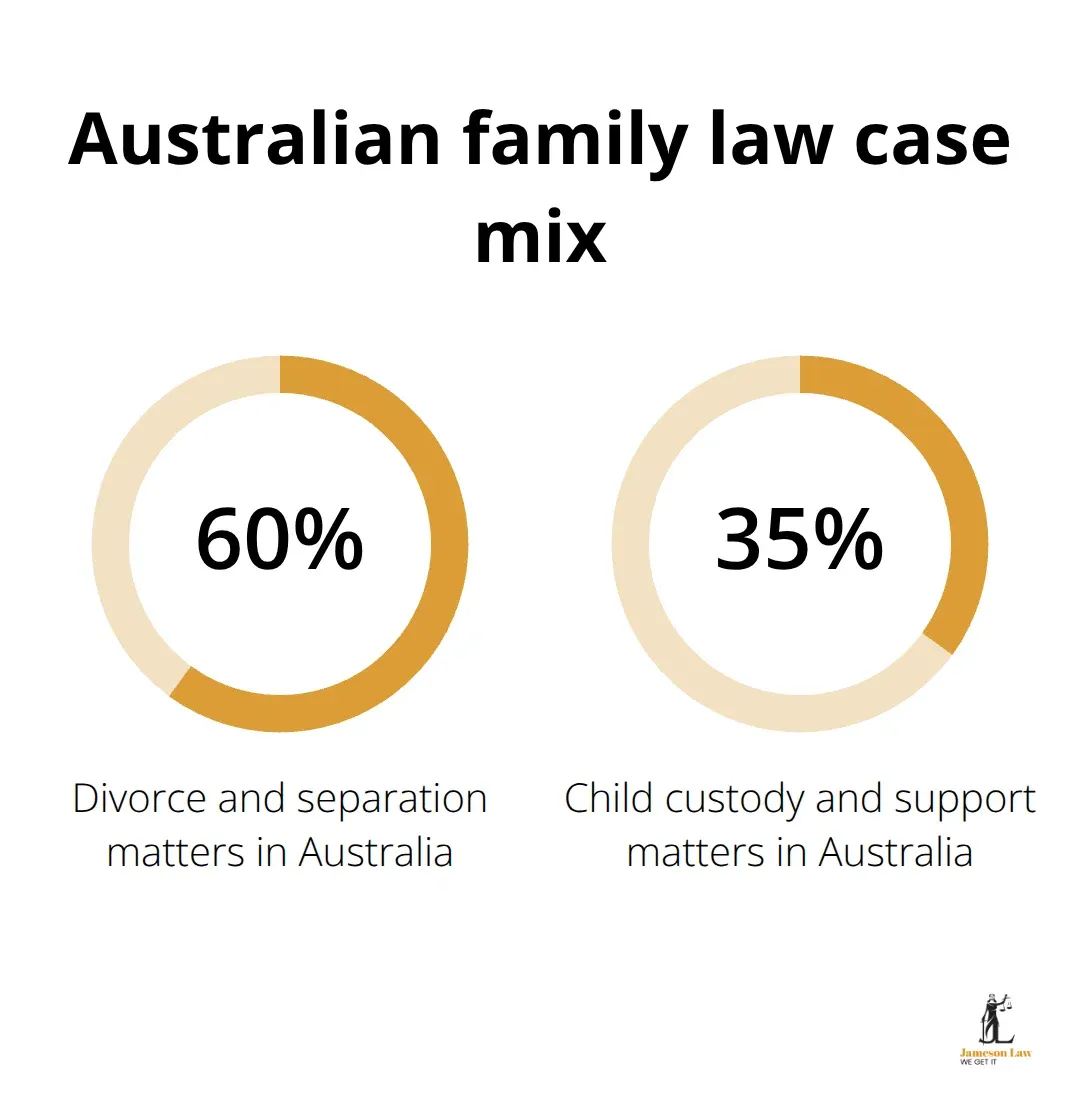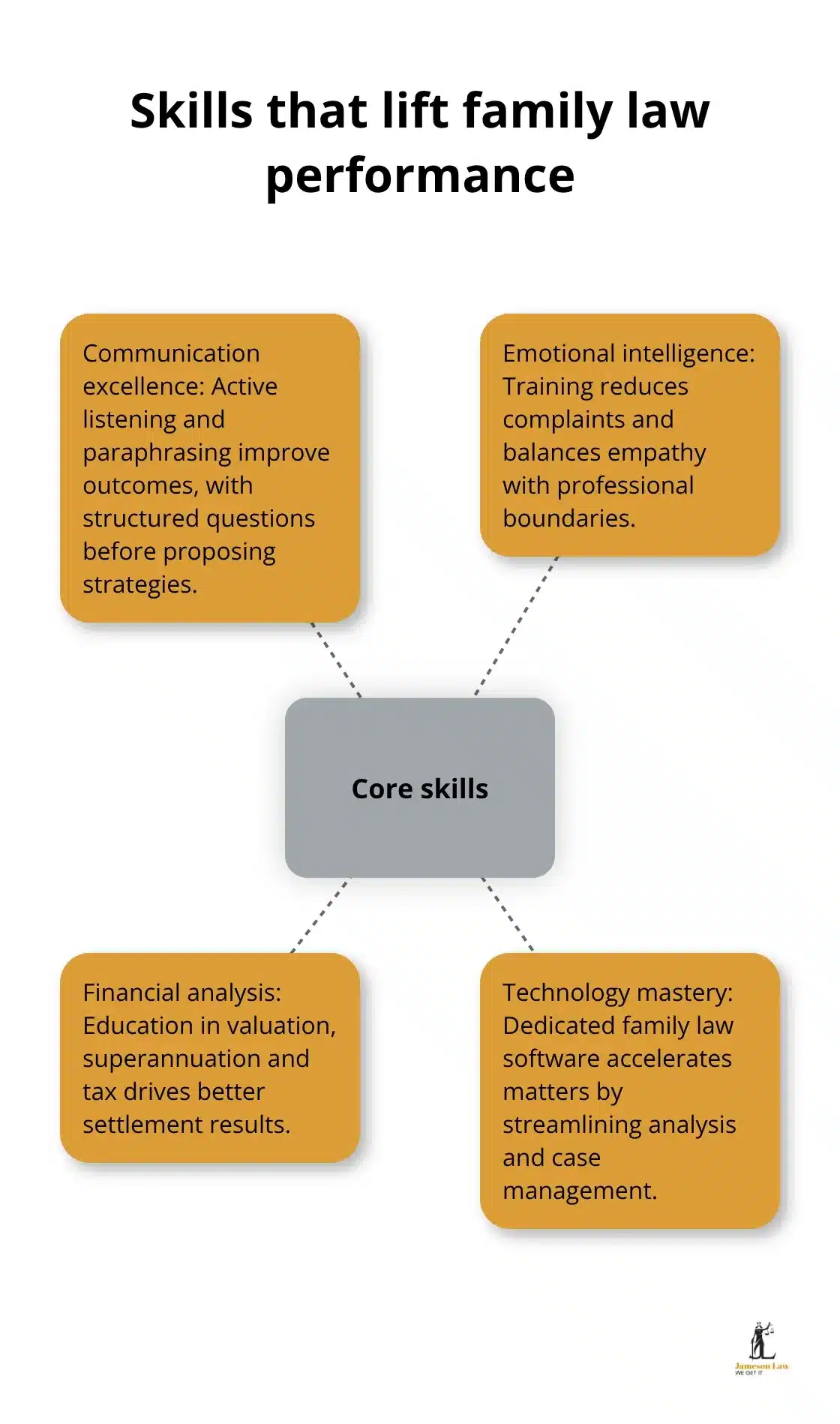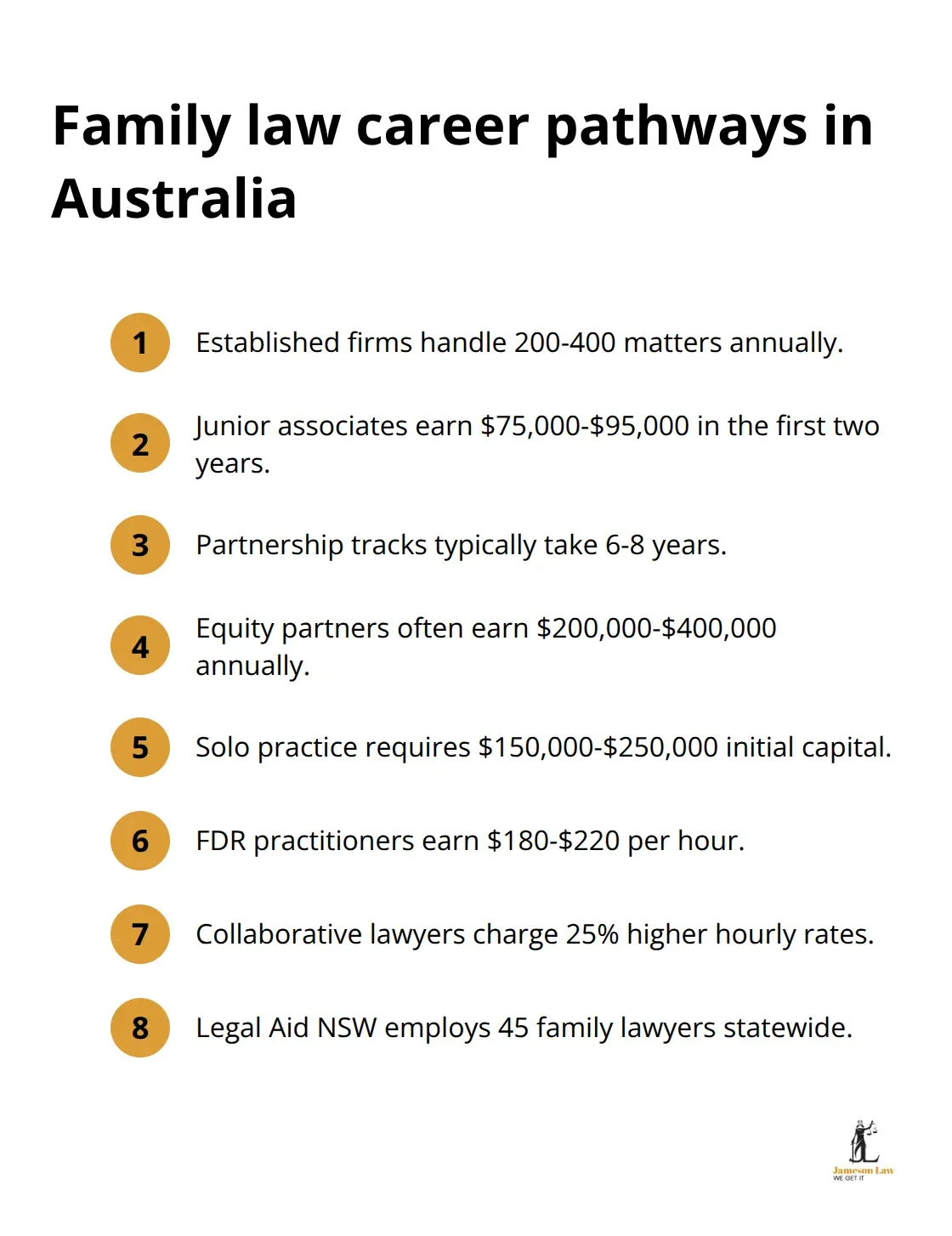Family law offers one of the most personally rewarding career paths in the legal profession. The field combines complex legal challenges with meaningful human connections that can transform lives.
We at Jameson Law understand that choosing to focus on family law requires strategic planning and specialised skills. This comprehensive guide will walk you through the essential steps to build a successful career in this dynamic practice area.
What Family Law Practice Areas Should You Master?
Family law encompasses three dominant practice areas that generate the majority of case volume and revenue for practitioners. Divorce and separation proceedings represent approximately 60% of all family law matters in Australia, making this the cornerstone of most practices. These cases involve complex procedural requirements under the Family Law Act 1975 (Cth), including mandatory family dispute resolution and financial disclosure obligations. The average divorce proceeding takes 12-18 months to resolve, with contested matters extending beyond two years. Practitioners must master the four-step property settlement process and understand binding financial agreements that can prevent costly litigation. See an overview at Federal Circuit and Family Court of Australia and our primer Family Law 101.

Child-Related Matters Drive Emotional Complexity
Child custody and support cases account for 35% of family law work but require the highest emotional intelligence and specialised knowledge. The court system processes parenting applications with high clearance rates, with many matters resolving through negotiation or mediation. Child support is administered by Services Australia – Child Support under the Child Support (Assessment) Act 1989. Practitioners need expertise in family violence screening and the best interests framework in s 60CA. Guidance for parenting matters: FCFCOA – Parenting.
Property Settlements Demand Financial Expertise
Financial agreements and property settlements represent the most technically demanding aspect of family law practice. The average Australian divorce involves assets that may include superannuation, business interests and real estate. Complex matters can involve self-managed superannuation funds or family trusts. Practitioners should be across CGT rollover on relationship breakdowns, see ATO guidance. The four-step approach (often associated with Hickey) remains foundational, with court process resources at FCFCOA – Property and a practical overview in Family Law 101.
Specialisation Creates Competitive Advantage
Successful family lawyers develop expertise in specific niches within these core areas. Examples include high-net-worth divorces, military families and international parenting issues. For mentoring and CPD, see the Law Council – Family Law Section and Attorney-General’s Department family law reform.

What Skills Separate Exceptional Family Lawyers from Average Practitioners
Communication failures are a common source of complaints. Exceptional family lawyers master three interconnected skill sets that transform practice effectiveness. See our quick primer on client communication in Family Law 101.
Communication Excellence Forms the Foundation
Active listening techniques identify underlying client concerns beyond stated legal issues. Effective practitioners ask open-ended questions and reflect emotional content back to clients before proposing legal strategies. Court-connected mediation information: FCFCOA – FDR.
Emotional Intelligence Reduces Client Complaints
Training through professional bodies such as the Australian Psychological Society and AASW supports trauma-informed practice that can reduce client distress during proceedings.
Advanced Financial Analysis Drives Settlement Success
Property settlements demand sophisticated financial analysis. CLE providers and the Family Law Section offer training in superannuation, business valuation and tax. See ATO rollover rules for relationship breakdowns: ATO – Relationships and separation.
Technology Mastery Accelerates Case Resolution
Master practitioners use purpose-built family law software and financial modelling tools. For collaborative and FDR pathways, see the Mediators Standards Board and Australian Association of Collaborative Professionals.

Which Career Path Maximises Your Family Law Success
Established family law firms provide the fastest pathway to expertise and professional credibility. Government guidance and workplace resources can be found via Legal Aid NSW and the FCFCOA. For planning your path, explore Resources for lawyers at Jameson Law.
Solo Practice Demands Business Acumen Beyond Legal Skills
Solo practice requires careful budgeting, PI insurance and trust accounting compliance. Practice-setup resources are available from the Law Society of NSW.
Alternative Pathways Offer Specialised Opportunities
Family dispute resolution and collaborative law offer strong income potential and greater control over workload. Accreditation and training options are listed with the Resolution Institute and Collaborative Professionals.
Government and Legal Aid Positions Build Foundation Skills
Government family law roles provide structured development and exposure to complex matters such as family violence and child protection. Explore opportunities and policy updates via Attorney-General’s Department and Legal Aid NSW.
Final Thoughts
Start your family law career with strategic preparation and specialised education. Complete your law degree with family law subjects and gain practical experience through legal clinics or internships at family law practices. Consider additional qualifications in family dispute resolution or collaborative law to stand out in the market.
Your first position should provide comprehensive mentorship and exposure to diverse case types. Whether you join an established firm or government legal aid office, focus on family law to build core competencies in client communication, financial analysis and negotiation techniques. Develop expertise in specific practice areas like high-net-worth divorces or child custody matters to command premium fees and establish professional credibility.
Long-term success depends on continuous professional development and strategic connections with other legal professionals. Complete advanced training in areas such as business valuation and trauma-informed practice to position yourself for partnership opportunities or successful solo practice. We at Jameson Law provide comprehensive legal services across NSW with experienced practitioners who combine technical expertise with compassionate client service. For a conversation about pathways or mentoring, contact Jameson Law or call (02) 8806 0866.













